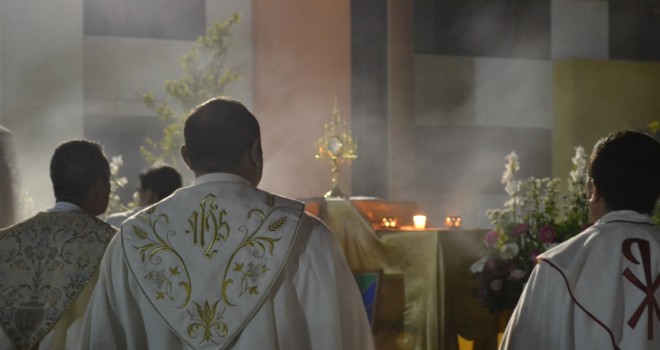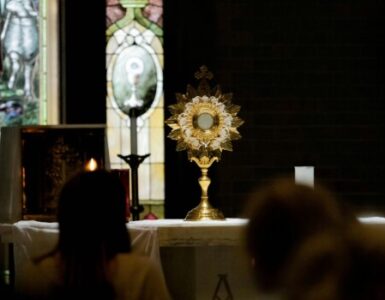We Catholics believe that the Eucharist is truly a sacrifice. When we celebrate Mass, God makes Jesus’s sacrifice on the cross present to us once again, allowing us to participate in it and offer it up to him in union with Jesus. In contrast, the vast majority of Protestants believe that the bread and wine (or water) are just a memorial service whereby we remember Jesus’s sacrifice, but we do not actually participate in it. To help resolve this debate, let’s turn to the story of Melchizedek and see how it connects to the Last Supper and the Eucharist.
The Story of Melchizedek
Back in Genesis, we read that Abram (later to be renamed “Abraham”) rescued his nephew Lot from captivity, and immediately afterwards, Melchizedek showed up seemingly out of nowhere:
“And Melchizedek king of Salem brought out bread and wine; he was priest of God Most High.And he blessed him and said,
‘Blessed be Abram by God Most High,
maker of heaven and earth;
and blessed be God Most High,
who has delivered your enemies into your hand!’
And Abram gave him a tenth of everything.”(Genesis 14:18-20)
This passage raises a lot of questions but, for our purposes here, I want to focus on just one: why did Melchizedek bring out bread and wine? The text doesn’t explicitly tell us, but it does give us a clue. Right after it mentions the bread and wine, it says that he was a priest, and that is very telling. It suggests that the bread and wine were somehow linked to his priesthood, so he did not bring them out just because he thought Abram might have been hungry. Rather, he brought them out because he was a priest, and since priests are by definition people who offer sacrifice, he must have offered them to God as a sacrifice.
A Priest Like Melchizedek
From that story alone we can already begin to formulate an argument for the sacrificial nature of the Eucharist, but if we want to make it as strong as possible, we can’t stop there. Instead, let’s now turn to the only other passage in the Old Testament that mentions Melchizedek, a key verse from the psalms:
“You are a priest forever
after the order of Melchizedek.”(Psalm 110:4)
In its original context, this psalm referred to the royal descendants of King David who ruled over the Israelites, but the New Testament applies it to Jesus (Hebrews 7:17), our new Davidic king (Matthew 1:1, 9:27). At first, it might seem odd to say that Jesus is a priest “after the order of Melchizedek.” In ancient times, there were no religious orders like we have today in the Catholic Church. So, what could that mean? It means a few things, but for our purposes here, let’s focus on just one: Melchizedek is an important biblical type (or foreshadowing) of Jesus.
The Last Supper
At the Last Supper, Jesus offered bread and wine to His disciples, an act clearly reminiscent of His forerunner Melchizedek’s. In fact, when Jesus did this, He used sacrificial language to describe the bread and wine, making the connection with Melchizedek impossible to miss. He said that His body was “given for you” (Luke 22:19), which in Greek literally means “given on your behalf,” implying that Jesus was offering His body as a sacrifice for His disciples. Similarly, He said that His blood was “poured out for many for the forgiveness of sins” (Matthew 26:28), and in the Old Testament, priests would “pour out” the blood of their sacrifices (Exodus 29:12, Leviticus 4:18).
Now, if Melchizedek foreshadowed Jesus, and Jesus offered bread and wine using sacrificial language, the connection between these two figures almost forces us to take the next step. Just as Melchizedek offered bread and wine as a sacrifice, so, too, did Jesus offer bread and wine as a sacrifice. It wasn’t just a metaphor; He wasn’t instituting a merely symbolic ritual. No: when He instituted the Eucharist, He meant it to be a real sacrifice.
The Mass is a Sacrifice
Melchizedek may not be a major figure in Scripture, but he’s an important one. He was a key forerunner to Jesus, and his story in Genesis helps us to understand what Jesus was doing when He instituted the Eucharist at the Last Supper. Since Melchizedek offered bread and wine as a sacrifice, the bread and wine that Jesus gave His disciples was a real sacrifice as well. It was a “pre-presentation” of His sacrifice on the cross the next day. So, every time we go to Mass and celebrate the Eucharist, we too are participating in that sacrifice—a “re-presentation,” as we say—joining ourselves to it and offering it up to the Father again with Jesus.
[Image: The Meeting of Abraham and Melchizedek by Dieric Bouts the Elder]












